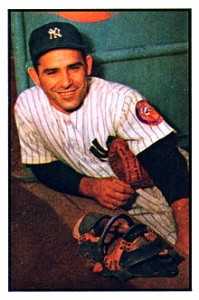Yogi Berra died at 90
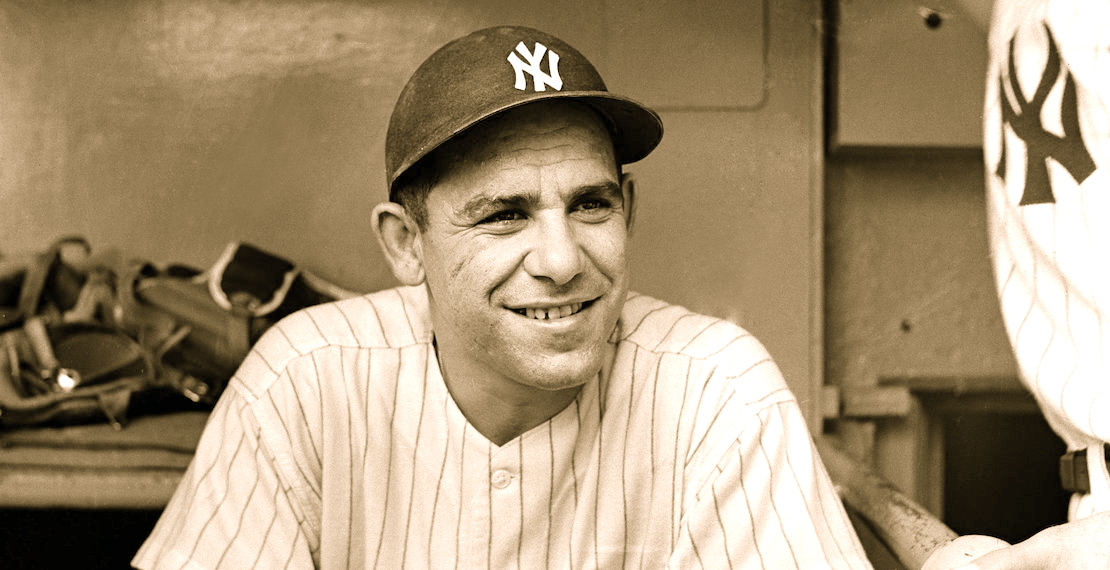
Baseball Legends Yogi Berra
Lawrence Peter “Yogi” Berra (May 12, 1925 – September 22, 2015) was an American Major League Baseball (MLB) catcher, manager, and coach. He played almost his entire 19-year baseball career (1946–65) for the New York Yankees. He is widely regarded as one of the best catchers in baseball history. He was elected to the Baseball Hall of Fame in 1972.
Berra was an All-Star for 15 seasons. He is one of only four players to be named the Most Valuable Player of the American League three times and is one of seven managers to lead both American and National League teams to the World Series. As a player, coach, or manager, Berra appeared in 21 World Series and won 13 of them. He was named to the Major League Baseball All-Century Team in a voting of fans in 1999.
Berra, who quit school after the eighth grade, was also known for his pithy and paradoxical quotes, such as “It ain’t over ’til it’s over,” while speaking to reporters. Simultaneously denying and confirming his reputation, Berra once stated, “I really didn’t say everything I said.
Early Life
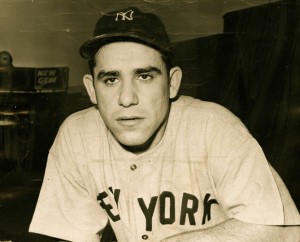 Yogi Berra was born in a primarily Italian neighborhood of St. Louis called “The Hill” to Italian immigrants Pietro and Paolina (née Longoni) Berra. Pietro, originally from Milan in northern Italy, arrived at Ellis Island on October 18, 1909, at the age of 23. In a 2005 interview for the Baseball Hall of Fame, Yogi said, “My father came over first. He came from the old country. And he didn’t know what baseball was. He was ready to go to work. And then I had three other brothers and a sister. My brother and my mother came over later on. My two oldest brothers, they were born there—Mike and Tony. John and I and my sister Josie were born in St. Louis.”
Yogi Berra was born in a primarily Italian neighborhood of St. Louis called “The Hill” to Italian immigrants Pietro and Paolina (née Longoni) Berra. Pietro, originally from Milan in northern Italy, arrived at Ellis Island on October 18, 1909, at the age of 23. In a 2005 interview for the Baseball Hall of Fame, Yogi said, “My father came over first. He came from the old country. And he didn’t know what baseball was. He was ready to go to work. And then I had three other brothers and a sister. My brother and my mother came over later on. My two oldest brothers, they were born there—Mike and Tony. John and I and my sister Josie were born in St. Louis.”
“Yogi’s parents originally nicknamed him “Lawdie,” derived from his mother’s difficulty pronouncing “Lawrence” or “Larry” correctly. He grew up on Elizabeth Avenue, across the street from boyhood friend and later competitor Joe Garagiola; that block, also home to Jack Buck early in his Cardinals broadcasting career, was later renamed “Hall of Fame Place.” Berra was a Roman Catholic, and he attended South Side Catholic, now called St. Mary’s High School, in south St. Louis with Garagiola. Berra has been inducted into the St. Louis Walk of Fame.
He began playing baseball in local American Legion leagues, where he learned the basics of catching while playing outfield and infield positions as well. Berra also played for a Cranston, Rhode Island team under an assumed name. While playing in American Legion baseball, he received his famous nickname from his friend Bobby Hofman who said he resembled a Hindu yogi whenever he sat around with arms and legs crossed waiting to bat or while looking sad after a losing game.
Professional Baseball Career – Minor Leagues
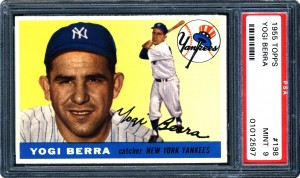 In 1942, the St. Louis Cardinals spurned Berra in favor of his boyhood best friend, Joe Garagiola. On the surface, the Cardinals seemed to think Garagiola the superior prospect—but team president Branch Rickey actually had an ulterior motive: knowing he was soon to leave St. Louis to take over the operation of the Brooklyn Dodgers and more impressed with Berra than he let on, Rickey apparently planned to hold Berra off until he could sign him for the Dodgers. However, the Yankees signed Berra for the same $500 bonus the Cardinals offered Garagiola, before Rickey could sign Berra to the Dodgers. The Yankees assigned Berra to the Norfolk Tars of the Class B Piedmont League, where his most memorable feat was driving in 23 runs in a doubleheader.
In 1942, the St. Louis Cardinals spurned Berra in favor of his boyhood best friend, Joe Garagiola. On the surface, the Cardinals seemed to think Garagiola the superior prospect—but team president Branch Rickey actually had an ulterior motive: knowing he was soon to leave St. Louis to take over the operation of the Brooklyn Dodgers and more impressed with Berra than he let on, Rickey apparently planned to hold Berra off until he could sign him for the Dodgers. However, the Yankees signed Berra for the same $500 bonus the Cardinals offered Garagiola, before Rickey could sign Berra to the Dodgers. The Yankees assigned Berra to the Norfolk Tars of the Class B Piedmont League, where his most memorable feat was driving in 23 runs in a doubleheader.
WWII
Berra served in the U.S. Navy during World War II, where he served as a gunner’s mate on the USS Bayfield during the D-Day invasion of France. Following his military service, Berra played minor league baseball with the Newark Bears, surprising the team’s manager with his talent despite his short stature. He was mentored by Hall of Famer Bill Dickey, whose number Berra took. He later said, “I owe everything I did in baseball to Bill Dickey.”
Major Leagues
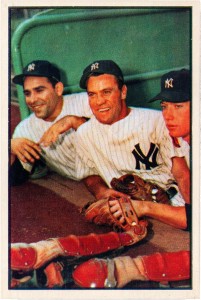 Yogi Berra with Hank Bauer & Mickey Mantle, 1953
Yogi Berra with Hank Bauer & Mickey Mantle, 1953
Berra played 7 games in 1946 and 83 games in 1947, for the Yankees. He would play more than one hundred in each of the following fourteen years. Berra appeared in fourteen World Series including 10 World Series championships, both of which are records.
In part because Berra’s playing career coincided with the Yankees’ most consistent period of World Series participation, he established Series records for the most games (75), at-bats (259), hits (71), doubles (10), singles (49), games caught (63), and catcher putouts (457). In Game 3 of the 1947 World Series, Berra hit the first pinch-hit home run in World Series history, off Brooklyn Dodgers pitcher Ralph Branca (who later gave up Bobby Thomson’s famous Shot Heard ‘Round the World in 1951).
Berra was an All-Star for 15 seasons, and was selected to 18 All-Star Games (MLB held two All-Star Games in 1959 through 1962). He won the American League (AL) MVP award in 1951, 1954, and 1955; Berra never finished lower than fourth in the MVP voting from 1950 to 1957. He received MVP votes in fifteen consecutive seasons, tied with Barry Bonds and second only to Hank Aaron’s nineteen straight seasons with MVP support. From 1949 to 1955, on a team filled with stars such as Mickey Mantle and Joe DiMaggio, it was Berra who led the Yankees in RBI for seven consecutive seasons.
One of the most notable days of Berra’s playing career came when he caught Don Larsen’s perfect game in the 1956 World Series, the first of only two no-hitters ever thrown in postseason play. The pictures of Berra leaping into Larsen’s arms following the 27th out are among the sport’s most memorable images.
Playing Style
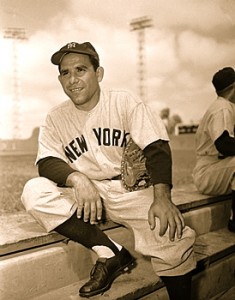 Berra was excellent at hitting poor pitches, covering all areas of the strike zone (as well as beyond) with great extension. In addition to this wide plate coverage, he also had great bat control. He was able to both swing the bat like a golf club to hit low pitches for deep home runs, and chop at high pitches for line drives. Whether changing speeds or location, pitcher Early Wynn soon discovered that “Berra moves right with you.” Five times, Berra had more home runs than strikeouts in a season, striking out just twelve times in 597 at-bats in 1950. The combination of bat control and plate coverage made Berra a feared “clutch hitter,” proclaimed by rival manager Paul Richards “the toughest man in the league in the last three innings.” Contrasting him with teammate Mickey Mantle, Wynn declared Berra “the real toughest clutch hitter,” grouping him with Cleveland slugger Al Rosen as “the two best clutch hitters in the game.” When asked about swinging at “bad pitches”, Berra reportedly said, “If I can hit it, it’s a good pitch.”
Berra was excellent at hitting poor pitches, covering all areas of the strike zone (as well as beyond) with great extension. In addition to this wide plate coverage, he also had great bat control. He was able to both swing the bat like a golf club to hit low pitches for deep home runs, and chop at high pitches for line drives. Whether changing speeds or location, pitcher Early Wynn soon discovered that “Berra moves right with you.” Five times, Berra had more home runs than strikeouts in a season, striking out just twelve times in 597 at-bats in 1950. The combination of bat control and plate coverage made Berra a feared “clutch hitter,” proclaimed by rival manager Paul Richards “the toughest man in the league in the last three innings.” Contrasting him with teammate Mickey Mantle, Wynn declared Berra “the real toughest clutch hitter,” grouping him with Cleveland slugger Al Rosen as “the two best clutch hitters in the game.” When asked about swinging at “bad pitches”, Berra reportedly said, “If I can hit it, it’s a good pitch.”
As a catcher, Berra was truly outstanding. Quick, mobile, and a great handler of pitchers, Berra led all American League catchers eight times in games caught and in chances accepted, six times in double plays (a major league record), eight times in putouts, three times in assists, and once in fielding percentage. Berra left the game with the AL records for catcher putouts (8,723) and chances accepted (9,520). He was also one of only four catchers to ever field 1.000 for a season, playing 88 errorless games in 1958. He was the first catcher to leave a finger outside his glove, a style most other catchers eventually emulated.
In June 1962, at the age of 37, Berra showed his superb physical endurance by catching an entire 22-inning, seven-hour game against the Tigers. Casey Stengel, Berra’s manager during most of his playing career with the Yankees and with the Mets in 1965, once said, “I never play a game without my man.” According to the win shares formula developed by sabermetrician Bill James, Berra is the greatest catcher of all time and the 52nd greatest non-pitching player in major-league history.
Later in his career, Berra became a good defensive outfielder in Yankee Stadium’s notoriously difficult left field.
Manager and Coach
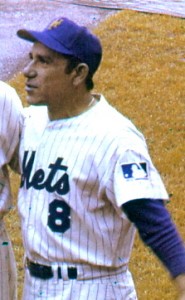 Berra as the New York Mets’ first base coach, 1969.
Berra as the New York Mets’ first base coach, 1969.
Berra retired after the 1963 World Series, and was immediately named to succeed Ralph Houk as manager of the Yankees. Much was made of an incident on board the team bus in August 1964. Following a loss, infielder Phil Linz was playing his harmonica, and Berra ordered him to stop. Seated on the other end of the bus, Linz could not hear what Berra had said, and Mickey Mantle impishly informed Linz, “He said to play it louder.” When Linz did so, an angry Berra slapped the harmonica out of his hands. All was apparently forgotten when Berra’s Yankees rode a September surge to return to the World Series, but the team lost to the St. Louis Cardinals in seven games, after which Berra was fired. Houk, who was general manager at the time, later said the decision to fire Berra was made in late August and that the incident with Linz had nothing to do with it. Although he didn’t elaborate, Houk said that he and the rest of the Yankee brain trust did not feel Berra was ready to manage.
Berra was immediately signed by the crosstown Mets as a coach. He also put in four cameo appearances as a catcher early in the season. His last at-bat came on May 9, 1965, just three days shy of his 40th birthday. Berra stayed with the Mets as a coach under Stengel, Wes Westrum and Gil Hodges for the next eight seasons, including their 1969 World Series Championship season. He then became the team’s manager in 1972, following Hodges’ unexpected death in spring training.
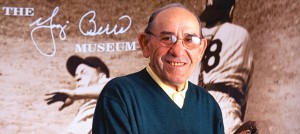 The following season looked like a disappointment at first. Injuries plagued the Mets throughout the season. Midway through the 1973 season, the Mets were stuck in last place but in a very tight divisional race. In July, when a reporter asked Yogi if the season was over, he replied, “It ain’t over till it’s over.”
The following season looked like a disappointment at first. Injuries plagued the Mets throughout the season. Midway through the 1973 season, the Mets were stuck in last place but in a very tight divisional race. In July, when a reporter asked Yogi if the season was over, he replied, “It ain’t over till it’s over.”
As the Mets’ key players came back to the lineup, a late surge allowed them to win the NL East despite an 82–79 record, making it the only time from 1970 through 1980 that the NL East was not won by either their rival Philadelphia Phillies or the Pittsburgh Pirates. When the Mets faced the 99-win Cincinnati Reds in the 1973 National League Championship Series, a memorable brawl erupted between Bud Harrelson and Pete Rose in the top of the fifth inning of Game Three. After the incident and the ensuing bench clearing brawl that followed had subsided, fans began throwing objects at Rose when he returned to his position in left field in the bottom half of the inning. Sparky Anderson pulled Rose and his Reds off the field until order was restored. When National League president Chub Feeney threatened the Mets with a forfeit, Berra walked out to left field with Willie Mays, Tom Seaver, Rusty Staub and Cleon Jones in order to plead with the fans to desist. Yogi’s Mets went on to defeat the highly favored Big Red Machine in five games to capture the NL pennant. It was Berra’s second as a manager, one in each league. The Mets fell to the Oakland Athletics in the 1973 World Series, but they went the distance in a close-fought, seven-game series.
 Berra hitting fungos prior to a game in 1981.
Berra hitting fungos prior to a game in 1981.
Berra’s tenure as Mets manager ended with his firing on August 5, 1975. He had a record of 298 wins and 302 losses, which included the 1973 postseason. In 1976, he rejoined the Yankees as a coach. The team won its first of three consecutive AL titles, as well as the 1977 World Series and 1978 World Series, and (as had been the case throughout his playing days) Berra’s reputation as a lucky charm was reinforced. Casey Stengel once said of his catcher, “He’d fall in a sewer and come up with a gold watch.” Berra was named Yankee manager before the 1984 season. Berra agreed to stay in the job for 1985 after receiving assurances that he would not be fired, but the impatient Steinbrenner did fire Berra after the 16th game of the season. Instead of firing him personally, Steinbrenner dispatched Clyde King to deliver the news for him. This caused a rift between Berra and Steinbrenner that was not mended for almost 15 years.
Berra joined the Houston Astros as bench coach in 1985, where he again made it to the NLCS in 1986. The Astros lost the series in six games to the Mets. Berra remained a coach in Houston for three more years, retiring after the 1989 season.
In 1999, after George Steinbrenner ventured to his home in New Jersey to apologize in person for the way his firing as Yankee manager was handled, Berra ended his 14-year estrangement with the Yankee organization and worked in spring training camp with catcher Jorge Posada.
Personal Life
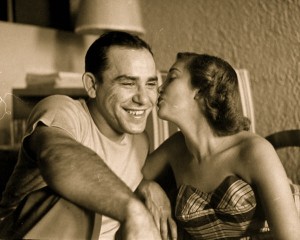 Berra married his wife Carmen on January 26, 1949. They have three sons and he was a longtime resident of Montclair, New Jersey, until his wife’s declining health caused them to move into a nearby assisted living facility. Two of Berra’s sons also played professional sports. His son Dale Berra played shortstop for the Pittsburgh Pirates, New York Yankees (managed by Yogi in 1984–85), and Houston Astros; his other son Tim Berra played pro football for the Baltimore Colts in 1974. Carmen Berra died on March 6, 2014 due to complications from a recent stroke, the couple having recently celebrated their 65th anniversary. Following Carmen’s death, the house in Montclair was listed for sale for $888,000, a reference to Yogi’s uniform number.
Berra married his wife Carmen on January 26, 1949. They have three sons and he was a longtime resident of Montclair, New Jersey, until his wife’s declining health caused them to move into a nearby assisted living facility. Two of Berra’s sons also played professional sports. His son Dale Berra played shortstop for the Pittsburgh Pirates, New York Yankees (managed by Yogi in 1984–85), and Houston Astros; his other son Tim Berra played pro football for the Baltimore Colts in 1974. Carmen Berra died on March 6, 2014 due to complications from a recent stroke, the couple having recently celebrated their 65th anniversary. Following Carmen’s death, the house in Montclair was listed for sale for $888,000, a reference to Yogi’s uniform number.
Death
Berra died on September 22, 2015, the same day as his MLB debut 69 years before. He was 90 years old.

